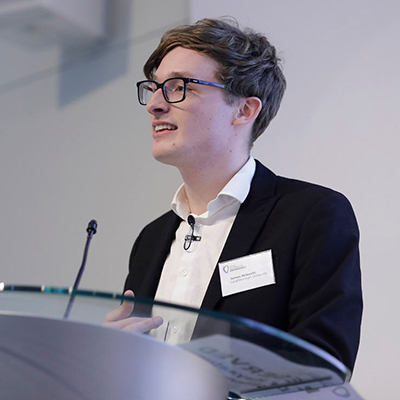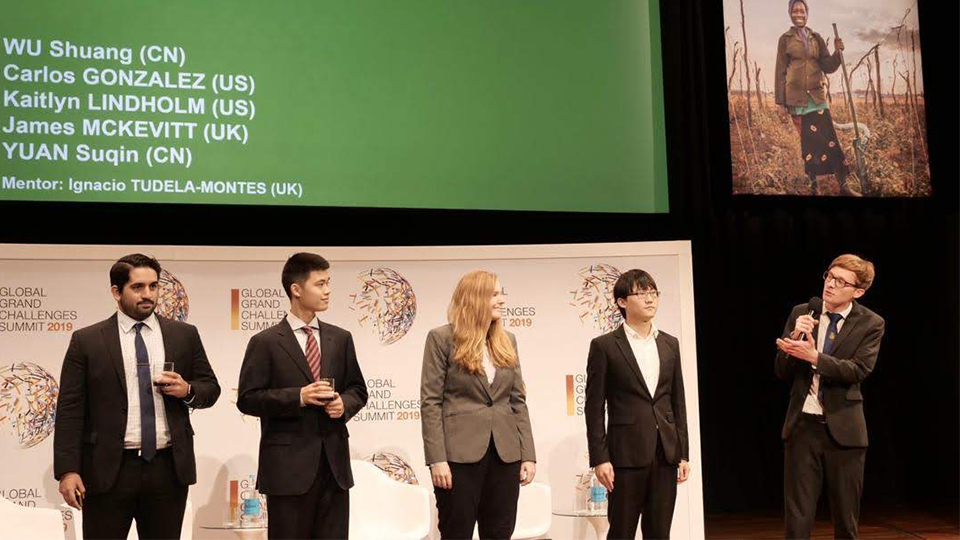Research that's out of this world
Start discovering - James graduated from Loughborough in 2020 with a degree in Aeronautical Engineering. He's now working at the Institute of Astrophysics in Vienna, where his research is focused 1.3 billion kilometres away...
Aeronautical engineering graduates are highly skilled, highly technical, and in high demand. Responsible for some of the most incredible human feats, they do much more than making sure we can jet off safely on our summer holidays.
New horizons

Graduate James McKevitt is now a researcher working on ways to travel across the Saturnian moon Titan, a better understanding of which will help inform climate change models for Earth.
The research investigates the feasibility of a new spacecraft on the Saturnian moon of Titan. I am currently working at the University of Vienna’s Institute of Astrophysics to simulate Titan’s surface lakes and the impact of a spacecraft into the liquid, in order to understand the structural loads penetration depth of the spacecraft. This is motivated by a need to perform in-situ measurements in the lakes.
My Titan research aims to prove that an ‘aerial-aquatic’ spacecraft concept for Titan is feasible and further research should be funded.
Lift off
The skills and knowledge James gained at Loughborough during his undergraduate degree have proved valuable to his current position, providing him with a solid foundation for his research.
My knowledge of fluid dynamics is something I use daily, and I regularly go back to my lecture notes for quick reminders of some fundamental fluid theories. The understanding we are given of engineering management and processes is also always very useful when trying to coordinate the work of different groups.
Loughborough’s links with industry, engineering facilities and TEF rating all convinced me it would be a great place for me to learn. The Aeronautical and Automotive Engineering Department were very friendly and supportive, and this continued throughout my degree. I wanted to study Aeronautical Engineering because I knew I wanted a career in the aerospace sector, and Loughborough provide a well-respected education in this area.

Space innovation
Alongside his day-to-day research, James, who graduated with an BEng in Aeronautical Engineering in 2020, also works on projects for Conex Research in his spare time. A portmanteau of Conceptual and Exploration, Conex is a young research organisation made up of students and early career researchers, which aims to produce science-driven concepts for space exploration.
I started Conex along with another Loughborough alumni, Christina Bornberg, during the first COVID-19 lockdown as a way for our old Loughborough Space society network to continue collaborating virtually. This group has now grown, with members in every continent bar Antarctica. We have a steady team of around 15 people, and are currently working towards conference presentations, one of which I plan to make in St. Petersburg and one in Dubai.
The group brings together a mix of disciplines, from astrodynamics, astronautical, electrical, design, mechanical, and nuclear engineering, planetary science and graphic design, with the aim of helping the group to develop their skills in research and space mission proposal writing. Conex propose pioneering spacecraft, with their first work entitled Arcanum, which consists of an orbital deep-space telescope and landing probe.
We are hoping to change the perceptions of what is possible with the new class of super-heavy lift launch vehicles, which is a vehicle capable of lifting more than 50 tonnes into low Earth orbit, such as SpaceX Starship or Blue Origin’s New Glenn.
The group brings together a mix of disciplines, from astrodynamics, astronautical, electrical, design, mechanical, and nuclear engineering, planetary science and graphic design, with the aim of helping the group to develop their skills in research and space mission proposal writing. Conex propose pioneering spacecraft, with their first work entitled Arcanum, which consists of an orbital deep-space telescope and landing probe.
We are hoping to change the perceptions of what is possible with the new class of super-heavy lift launch vehicles, which is a vehicle capable of lifting more than 50 tonnes into low Earth orbit, such as SpaceX Starship or Blue Origin’s New Glenn.
Inspiring the next generation
Throughout his time at Loughborough, James was a formidable member of the Loughborough Space Society, where he previously held the position of Chair and led a team of his peers in building a hybrid rocket engine, named Chimera.
I joined the Loughborough Space Society as Rocketry Lead in my first year of university and remained in the committee throughout my time in Loughborough. I learned a large amount during my time with the society, and many of the skills – both soft skills and engineering knowledge – that I use in my day-to-day work come from time with Loughborough Space. The society are currently working through a very ambitious and successful rocket engine construction project and benefit from some of the most talented and enthusiastic students at the university.
In my opinion, they are a fantastic outward-facing organisation which represents Loughborough, and with relatively limited funding compete, and sometimes outperform, well-funded and long-established societies across the UK. Anyone who is interested in enriching their curriculum, making great friends, and building rocket engines should join.
James also undertook several outreach projects whilst studying at Loughborough, aiming to inspire the next generation to follow a career in science, technology, engineering or maths (STEM).
At Loughborough, I was primarily involved with outreach through Loughborough Space. For me, this involved the starting of Rocket in a Box, which is a classroom resource for GCSE students and below, and introduces them to the basic concepts of rocketry and helps them to learn more about what a future career in STEM could do for them.

Reaching for the stars
Recipient of an Engineering Leaders Scholarship from the Royal Academy of Engineering, a Fellow of the Royal Astronomical Society, and an advisor on early careers to the Royal Aeronautical Society, James has gained significant recognition during his academic career so far. As an Engineering Leaders Scholar, James received funding for career personal development activities, as well as mentoring from senior engineers.
This scheme is openly advertised by the Royal Academy of Engineering, and has really enhanced my career. This jointly funded, along with Royal Astronomical Society funding, my undergraduate research opportunities programme. Through this, I met Anne, Princess Royal and presented to a very distinguished audience of over one-thousand engineer professionals. I spoke about the UN Global Grand Challenges, and have since been invited by the Royal Academy of Engineering to speak about climate change, to a large and distinguished audience.
In the future, James would like to see himself as part of a larger, more established and well-respected Conex Research team. He also hopes to expand his Saturnian research:
I would like to advocate further for my Titan concept, and managed to link the UK with other countries in the EU through my research. I also currently sit on the Royal Aeronautical Society’s Space Specialist Committee, and would like to increase my participation in the discussions they have with UK Government on policy matters.

Apply now
Find out everything you need to know about applying to study at university and start your Loughborough journey!